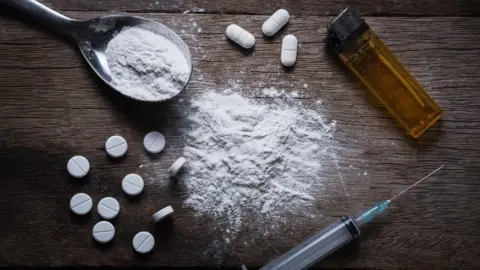Rising drug deaths not due to ageing users, says report
 Getty Images
Getty ImagesThe rise in drug-related deaths in Scotland is not due to users getting older, a major new report suggests.
A study of nearly 50,000 people who used opiods between 2011 and 2020 found death rates increased across all age groups.
It also highlighted that the rate for those not in treatment was three-and-a-half times higher than those who were.
Researchers have now called for increased treatment for heroin and morphine users.
But they warn that opioid agonist treatment (OAT), where people are prescribed a substitute such as methadone, will not be enough on its own to solve Scotland's overdose epidemic.
The Scottish government has pledged an extra £250m to tackle the "national disgrace" of drug-related deaths.
Dr Andrew McAuley of Glasgow Caledonian University, was a principal investigator on the study which was the largest of its kind ever conducted in Scotland.
He told the BBC's Good Morning Scotland programme that previous funding cuts may have had as much to do with increased deaths as overdoses among older drug users.
Dr McAuley said: "One of the theories put forward relating to Scotland's overdose epidemic is this so-called ageing cohort effect.
"But we found that mortality rates had increased across all groups, suggesting that wasn't the main driver behind trends."
He added: "There are no magic bullets here and we're certainly not suggesting putting in measures to replace the existing measures.
"This study absolutely confirms the importance of drugs like methadone because the protective effect is very clear.
"But resources should be put into the whole treatment system.
"We don't have things such as drug consumption rooms or safe supply initiatives which are important evidence-informed responses to countries who have a toxic street drug supply."


When drug deaths started to rise in the mid-2010s, the term "Trainspotting generation" became popular shorthand.
A hangover from the 1990s, this group of people had started using drugs young but were only now dying in their 40s and 50s.
It was theorised that those deaths were the cause of Scotland's ever-increasing rate.
At the same time, however, frontline workers were dealing with a younger group coming behind them.
Today's research is substantial and includes the majority of Scotland's problem users in the last 10 years.
It shows that while people from their mid-40s onwards were more likely to suffer a fatal overdose, it wasn't the driving force behind the country's record figures.
Across every age group, the death rate increased. But why?
Etizolam - known as street Valium - has been a catalyst. The first death attributed to this benzo substitute was an outlier in 2012.
Since then, it has flooded Scotland's poorer communities where the people included in this study would mix it with opioids and alcohol.
It has been involved in more than 750 deaths in each of the last three years.
In an interview with BBC Scotland, lead researcher Andy McAuley says it was a major factor.
He also pointed to funding cuts to addictions services several years ago that may have made the problem worse.

The latest official figures show the number of suspected drug deaths in Scotland increased towards the end of 2022.
In the first nine months of last year, figures published by Public Health Scotland (PHS) showed a 21% reduction in the number of fatal overdoses.
However, numbers then began to rise, with more than 100 deaths in recorded in a single month.
The PHS Rapid Action Drugs Alerts and Response (Radar) quarterly report showed 109 people had died from suspected drug deaths in November.
This was higher than the same month in both 2021 (89) and 2020 (93).
Scotland continues to have the highest drug death rate recorded by any country in Europe.
The Scottish government's drug and alcohol policy minister Elena Whitham said that drug deaths "are still too high and every life lost is a tragedy".
She added: "Through our £250m National Mission on drugs, I'm focused on supporting those affected by problem substance use, delivering real change on the ground and implementing evidence-based approaches to improve and save lives.
"We're also working towards introducing safer drug consumption facilities, as well as a pilot scheme to deliver drug-checking facilities."
'Out of control'
Scottish Conservative drugs spokesperson Sue Webber MSP said the research "sheds light on Scotland's appalling drugs-death epidemic, which has spiralled out of control on the SNP's watch".
She added: "The standout statistic from it is the one highlighting the stark difference in mortality rates between users who receive treatment for their dependency, and those who don't.
"Treatment programmes can literally be a life-saver for those with addiction issues, but accessing them is a huge problem for so many - and the buck for that stops with the SNP government, who are failing vulnerable Scots.
